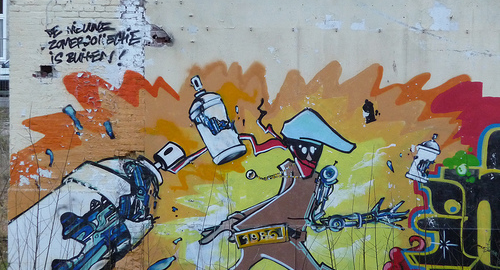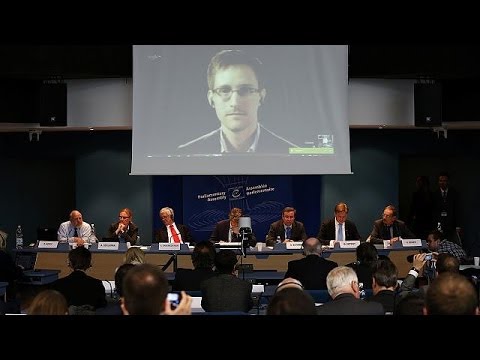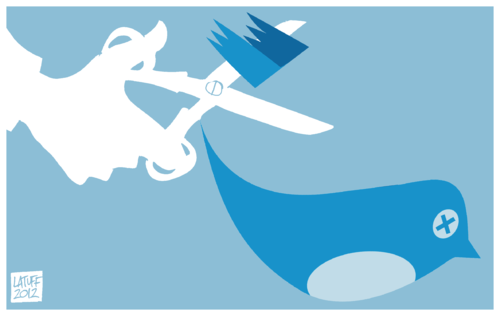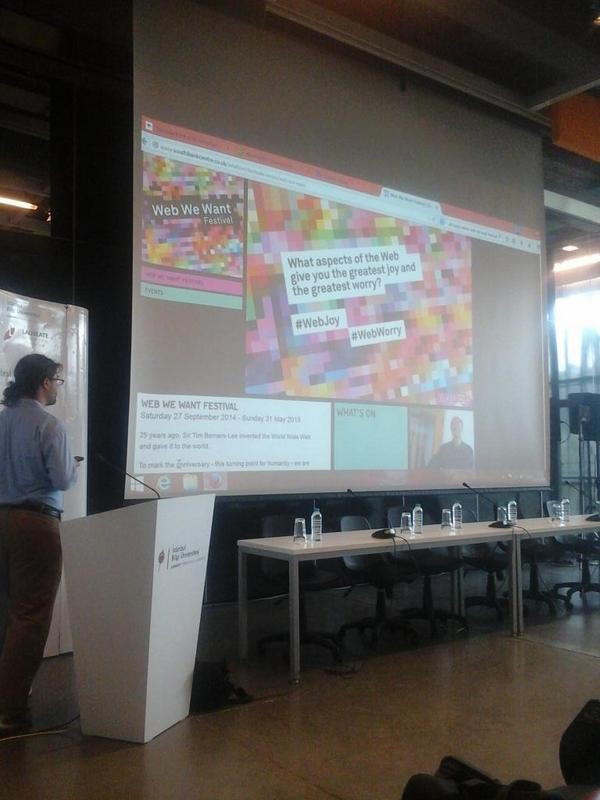Origin of the forum
For the first time since its establishment in 2006 the Internet Governance Forum (IGF) of ICANN [1] is paralleled with a protest forum, the Internet Ungovernance Forum.
Internet protests all over the world until now were addressed against national states and international organizations wanting to limit internet freedom and net neutrality or against those state and non-state services breaching privacy on the net, but this time a critique is formulated against the Internet governance itself by the Internet Ungovernance Forum. The announcement stated:
“We see that at IGF the most urgent problems of the Internet do not get the right attention. Due to the “multi-stakeholderism” format, the main perpetrators of many of the Internet’s problems, governments and corporations, are getting representation in IGF they don’t deserve. Given these circumstances, we decided to take initiative to defend the Internet as we know it and to create a space to raise the voices of civil society initiatives, activists and common people.”
In fact the organizers themselves were surprised about their initiative as one can read in their welcoming statement at the forum:
“What started as an idea to have a party at the local hacker space, since all of our workshop proposals were rejected at IGF, has turned into something much bigger than we could have ever imagined. And, yet, things easily grow over our heads in Turkey, so this is nothing to be too surprised about.”
Wikileaks, Snowden’s revelations about NSA are the major events that obliged the sleeping internauts to change course. Not surprisingly that Snowden,Assange and Jacob Appelbaum (Tor project) were present at the Ungovernance Forum, delivering keynote speeches. See for the streaming at Leak Source.
In Turkey a vivid grassroots movement born at the Gezi-park and on the Taksim square also concerned with the social problems in the real world is playing a mayor role in the background. See Everywhere Taksim, Erkan’s Field Diary and Temporal. What the hack were they thinking at the IGF to meet at Istanbul after all, some bureaucrat must have thought.
Freedom of speech threatened in Turkey
In the months approaching the IGF meeting, human rights advocates have made the point that recent human rights violations around protests, and the government’s increasing propensity for censoring major web platforms like Twitter, make Turkey a peculiar location for a meeting that largely focuses on the relationship between global Internet policy and human rights.
In a recent piece, Reporters Without Borders noted that Turkey was ranked 154 on RSF’s 2013 World Press Freedom Index. This is nothing new for the IGF, they point out — last year’s meeting took place in Bali, Indonesia, which ranked 132, and IGF 2012 took place in Baku, Azerbaijan, which ranked 160 on the Index.
The organising Alternative Informatics Association already explained in June 2013 the need for social media resistance. The following quote lets us realise that internet freedom is something you have to fight for in plenty of countries, some of them we think that are free:
“The wave of resistance that started at Gezi Park on the 29. of May [2013] in Istanbul and has since spread all over Turkey once again revealed a deep connection between real time communication on social media and social movements. Throughout the protests, social media platforms have become the primary news source in this environment where the mainstream media have proven themselves to be the site of disinformation or inertia. But even more importantly, social media have become indispensable as a source of information for those who have been actively organizing on the ground, cooperating with different national and international groups, showing solidarity, gathering evidence against the security forces and providing medical and legal assistance.
(…)
In an interview, the Prime Minister declared that social media is a “menace to society” and it is full of slander and lies. Vice-Prime Minister Bulent Arinc stated that social media platforms are centers of mass manipulation and the government could block/cut off access if they wanted. What is most unfortunate in Arinc’s statement is the government’s open threat to put further constraints on the basic freedoms associated with the use of the Internet. But the threats were not limited to legal constraints, AKP’s social media advisor Ali Sahin claimed that “A false tweet is more dangerous than a car bomb. Legal arrangements regarding social media is a must” and hinted at an upcoming arrangement to control the Internet based on dubious legal grounds using disciplinary actions.”
Aims
The Internauts in Istanbul propose clear and simple to descend from the golden cage many internauts have lived in during the recent years, I copy large laps of their welcoming text here, because I think it is a major turn:
“Turkey is not unique. There is a direct connection today between how states and corporations treat people and our natural resources; the discontent expressed across main squares of the world, and the struggles against surveillance and censorship. So we thought, we need a forum to discuss the divides that keep us from connecting the dots. Here is our initial list of divisions we felt the need to address:
Divide 1: We are long beyond the point where the online and offline distinction makes sense. “The internet” is not separate from the “real” world. The so called “smugglers” massacred in Roboski were not online, yet their tragedy is implicated in our struggles. It is not sufficient to demand only “digital human rights”, we must simply demand fundamental rights and justice.
Divide 2: It is not reasonable to see the internet independent of other common infrastructures. We need to recognize that what information is to the internet activist, is the seed to the environmental activist, is the public space to the urban activist and so on. All of these movements are fighting against corporate monopolies and their governmental collaborators. It is in solidarity with these struggles that we can best reclaim our rights.
Divide 3: There is a serious division between those who develop technologies and those who do “internet policy”. These people usually complain about each other. Let us complain about both. Even if activist minded, it is easy to fall into technocratic solutionism when fighting for policy change or developing disruptive technologies. Our question to you, what are you going to do to crack open your close knit networks with fancy vocabularies so that we can have an internet of the people?”
This is of course a radical agenda and in my opinion the digital divide remains but must be seen as a social problem and not just as an educational one.
Participants
When visiting the website of the Ungovernance Forum, I saw the list of participations grow every day. But three organisations defending the internet from the start during the eighties and nineties were present quite quickly: the Association for Progessive Communication (APC), the Chaos Computer Club (CCC) and the Electronic Frontier Foundation (EFF). In fact this is no surprise, though at least APC and EFF were also present at the official IGF.
The remaining visititing organizations were AccessNow, Alternative Informatics Association, Article19, Association for Digital Rights and Freedoms, Chamber of Electrical Engineers, European Digital Rights (EDRI), Internet Technologies Association, Istanbul hackerSpace, Linux Users Association, Open Rights Group, Tactical Tech and Web We Want. Also many of these organisations were present at the IGF. Tactical Tech even brought them together on one page.
The organisers were prepared to counter the confusion between IGF and IUF so a special workshop was held about that question: Governance or Ungovernance, A Strategy Workshop for Internet Activists The life stream can be seen here:
Other life streams can be found at Capul TV. The sources proposed as preparation are worth reading, some of them are familiar. See at the end of the article.
Activities and subjects treated at the IUF
Part of the program was prepared by the organizers but many workshops were also proposed by te visitors and there was also a discussion between London and Istanbul about shaping the web we want
Four Panels were prepared by the organizers:
Internet and Human Rights in Turkey (Elif Küzeci, Bahçeşehir University, Kerem Altıparmak, Ankara University, Law Faculty, Ben Wagner, Agnes Callamard – Columbia University)
Solidarity Against Dispossession in the City and on the Internet (Elif Ince – Radikal Gazetesi, Yasar Adanali – Mutlu Kent, 1Umut, Joana Varon, Niels ten Oever – Article19, Aslı Telli Aydemir – Sehir University & AIA)
Citizen Journalism and Alternative Media (Elif Akgül – Bianet, Tuba Güneş – Çapul TV, Sarphan Uzunoğlu – jiyan.org, Fırat Yumuşak – Ötekilerin Post, Gillo Cutrupi, Tactical Tech, Mallory Knodel, APC dokuz8)
Surveillance & Net Neutrality (Katitza Rodriguez – EFF, Amelia Andersdotter – Pirate Party, Sweden, Melih Kırlıdoğ – AIA, Chris Soghoian – ACLU, Markus Beckedahl – Netzpolitik.org)
Workshops were prepared on Cryptography and Dataprotection.
The workshops proposed for the Unconference were:
Milton Mueller, IANA transition and the role of states in Internet governance
Katitza Rodriguez and Amie Stepanovich, Strategic Meeting Planning a Week of Action Against Mass Surveillance: The 13 Principles Surveillance Coalition Informal Meeting
John A. Sweeney, Future(s) of the Internet
Gökhan Yücel, Digital Diplomacy and Internet Governance
Fatma Zengin, Internet safety & Child Abuse
Walid Al-Saqaf, Internet Censorship During the Arab Spring and Ways to Circumvent them
Andrii Paziuk, Information control and propaganda: two sides coin of totalitarism
Barkın Kılıç, Network Traffic Monitoring and Tunneling for Censorship
Transparency Int, Internet, from privacy to surveillance technologies
Amalia Deloney, Net Neutrality
Discussion about shaping the web we want
Participants at the Ungovernance Forum in Istanbul (co-supported by the Web We Want campaign) and the Web We Want Festival Think-In in London virtually convened to discuss the Web We Want and to help shape the upcoming Web We Want Festival. Participants at both events, as well as the online community, were able to share their thoughts on the future of the Web and contribute their ideas for areas to explore at the Festival using the hashtag #WebWeWantFest.
Sources about the discontent
Internet Governance Project blog: http://internetgovernance.org
The Citizen Lab: https://citizenlab.org/
Paper: Finding a Formula for Brazil: Representation and Legitimacy in Internet Governance.
“EDRI papers” wich are booklets on different specific digital rights topic. All the papers/booklets
The Internet Rights & Principles Coalition Charter
Website of the IGF Internet Rights and principles coalition: http://internetrightsandprinciples.org/site/
The IRPC charter of human rights and principles for the internet: http://internetrightsandprinciples.org/site/wp-content/uploads/2013/10/IRP_booklet_final1.pdf
The IRPC 10 Internet Rights & Principles: http://internetrightsandprinciples.org/site/campaign/
Additional sources worth further reading
For Spanish readers Technokultura Vol 11, No 2 (2014): Global Surveillance and Forms of Resistance
For English readers Tripple C Vol 12, No 2 (2014)
and some remarkable articles and books
Andrejevic, Mark, Surveillance in the digital enclosure, 2007, The Communication Review, 10: 295–317, 2007, retrieved on 09 September 2014 at http://sspa.boisestate.edu/communication/files/2010/05/Andrejevic-Surveillance-in-the-Digital-Enclosure.pdf
Hansen, Ejvind, 2012, Freedom of Expression in Distributed Networks, in tripleC 10(2): 741-751, 2012, retrieved on 08 September 2014 at http://www.triple-c.at/index.php/tripleC/article/viewFile/450/419
Kostakis, Vasilis, Stavroulakis, Stelios, 2013, The Parody of the Commons, in tripleC 11(2): 412-424, 2013, retrieved on 08 September 2014 at http://www.triple-c.at/index.php/tripleC/article/download/484/488
Zittrain, Jonathan L., 2008, The Future of the Internet — And How to Stop It Yale University Press & Penguin UK 2008), retrieved on 08 September 2014 at http://nrs.harvard.edu/urn-3:HUL.InstRepos:4455262
[1] If you want to know more about how internet is governed look at the wikipedia pages ‘Internet Governance’ and ‘Internet organizations’



